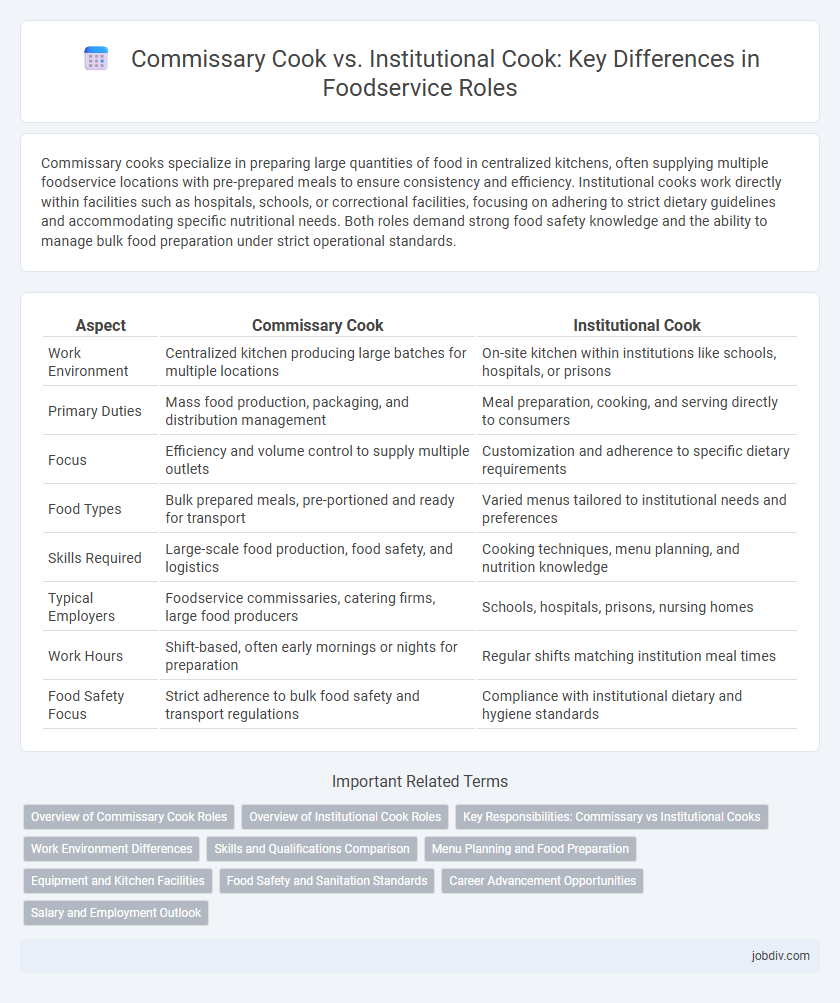Commissary cooks specialize in preparing large quantities of food in centralized kitchens, often supplying multiple foodservice locations with pre-prepared meals to ensure consistency and efficiency. Institutional cooks work directly within facilities such as hospitals, schools, or correctional facilities, focusing on adhering to strict dietary guidelines and accommodating specific nutritional needs. Both roles demand strong food safety knowledge and the ability to manage bulk food preparation under strict operational standards.
Table of Comparison
| Aspect | Commissary Cook | Institutional Cook |
|---|---|---|
| Work Environment | Centralized kitchen producing large batches for multiple locations | On-site kitchen within institutions like schools, hospitals, or prisons |
| Primary Duties | Mass food production, packaging, and distribution management | Meal preparation, cooking, and serving directly to consumers |
| Focus | Efficiency and volume control to supply multiple outlets | Customization and adherence to specific dietary requirements |
| Food Types | Bulk prepared meals, pre-portioned and ready for transport | Varied menus tailored to institutional needs and preferences |
| Skills Required | Large-scale food production, food safety, and logistics | Cooking techniques, menu planning, and nutrition knowledge |
| Typical Employers | Foodservice commissaries, catering firms, large food producers | Schools, hospitals, prisons, nursing homes |
| Work Hours | Shift-based, often early mornings or nights for preparation | Regular shifts matching institution meal times |
| Food Safety Focus | Strict adherence to bulk food safety and transport regulations | Compliance with institutional dietary and hygiene standards |
Overview of Commissary Cook Roles
Commissary cooks specialize in preparing large quantities of food in centralized kitchens to supply multiple foodservice outlets, ensuring consistent quality and adherence to stringent safety standards. Their role involves menu planning, batch cooking, ingredient procurement, and overseeing storage protocols to optimize efficiency and reduce waste. Unlike institutional cooks, commissary cooks focus more on mass production and distribution rather than direct service in on-site dining facilities.
Overview of Institutional Cook Roles
Institutional cooks specialize in preparing meals in large-scale facilities such as schools, hospitals, and correctional institutions, emphasizing efficiency, safety, and compliance with strict dietary regulations. Their roles involve batch cooking, menu planning tailored to institutional requirements, and maintaining sanitary conditions in high-volume kitchens. Expertise in food storage, portion control, and inventory management is essential for meeting nutritional standards and minimizing waste.
Key Responsibilities: Commissary vs Institutional Cooks
Commissary cooks primarily focus on large-scale food production, preparing bulk meals for distribution to multiple locations while ensuring strict adherence to safety and sanitation standards. Institutional cooks work on-site within facilities such as hospitals or schools, managing daily meal preparation tailored to specific dietary needs and schedules. Both roles require expertise in inventory management and food quality control, but commissary cooks emphasize batch cooking efficiency, whereas institutional cooks prioritize individualized meal service.
Work Environment Differences
Commissary cooks typically operate in centralized kitchens where large quantities of food are prepared for multiple locations, emphasizing efficiency and bulk production. Institutional cooks work directly within facilities such as schools, hospitals, or correctional institutions, tailoring meals according to specific dietary guidelines and client needs. The commissary environment prioritizes industrial-scale equipment and routine, while institutional settings demand adaptability to meal schedules and regulatory standards.
Skills and Qualifications Comparison
Commissary cooks require advanced organizational and batch cooking skills to prepare large volumes of food efficiently for distribution to multiple locations. Institutional cooks must have strong knowledge of nutrition guidelines and portion control to meet specific dietary needs within schools, hospitals, or correctional facilities. Both roles demand proficiency in food safety standards, knife skills, and the ability to follow standardized recipes.
Menu Planning and Food Preparation
Commissary cooks focus on large-scale menu planning, preparing bulk quantities of food for distribution to multiple locations, emphasizing consistency and efficiency. Institutional cooks tailor menu planning to specific dietary guidelines and nutritional requirements for facilities like hospitals and schools, ensuring balanced, health-compliant meals. Food preparation in commissary settings relies on standardized recipes and batch cooking techniques, while institutional cooks adapt preparation methods to accommodate varied client needs and portion sizes.
Equipment and Kitchen Facilities
Commissary cooks typically operate in centralized kitchens equipped with industrial-grade appliances designed for large-scale food production and batch cooking, supporting multiple foodservice locations. Institutional cooks work within facilities like schools or hospitals, utilizing specialized equipment tailored to specific dietary needs and bulk meal preparation on-site. The kitchen layout in commissaries emphasizes efficiency and volume, while institutional kitchens prioritize accessibility and compliance with health regulations.
Food Safety and Sanitation Standards
Commissary cooks operate in centralized kitchens preparing large volumes of food under strict HACCP guidelines to ensure consistent food safety and sanitation standards across multiple service locations. Institutional cooks work on-site within facilities like schools or hospitals, emphasizing adherence to local health codes and routine sanitation protocols to prevent cross-contamination and maintain safe food handling practices. Both roles require comprehensive knowledge of temperature control, allergen management, and cleaning schedules to uphold regulatory compliance and protect consumer health.
Career Advancement Opportunities
Commissary cooks often gain experience in large-scale meal production, providing a strong foundation for advancement into supervisory roles within centralized kitchen operations. Institutional cooks typically develop specialized skills in menu customization and dietary accommodations, leading to opportunities in healthcare or educational foodservice management. Both paths offer career growth through certifications and leadership training tailored to their operational environments.
Salary and Employment Outlook
Commissary cooks typically earn an average salary ranging from $30,000 to $45,000 annually, with employment opportunities concentrated in large-scale food production facilities. Institutional cooks, working in settings like hospitals and schools, generally have a median salary between $28,000 and $42,000 and experience steady demand due to the consistent need for meal preparation in public institutions. Both roles benefit from growing foodservice sectors, but commissary cooks may see increased opportunities linked to the expansion of centralized meal production and catering operations.
Commissary Cook vs Institutional Cook Infographic

 jobdiv.com
jobdiv.com